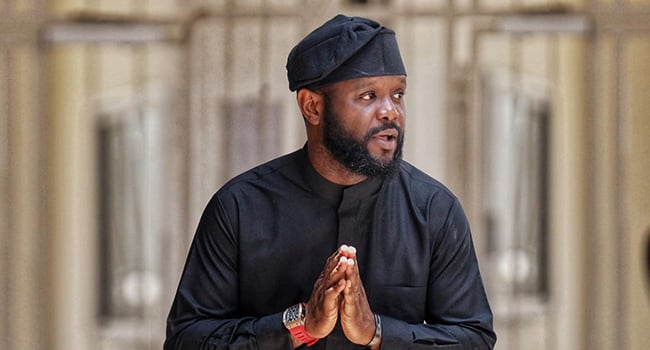The Seyi Tinubu video that recently went viral has triggered a wave of online speculation and misinformation. Many social media users rushed to label the brief clip of Seyi Tinubu and Nigerian Fuji legend Saheed Osupa as evidence of cultist behavior. However, no credible source or verified authority has found any connection between the gesture in the video and any known cult symbol. The entire episode reveals how quickly social media misinterpretation can transform a casual public moment into a trending controversy.
The short clip shows Seyi Tinubu exchanging a spirited greeting with Saheed Osupa during a public event in Lagos. Some viewers misread the gesture as a secret cult signal, fueling heated debates and wild assumptions across digital platforms. In reality, the footage appears to capture nothing more than an animated exchange between two public figures. The lack of evidence supporting these claims highlights how viral culture often thrives on speculation rather than truth.
Public records show no evidence linking Seyi Tinubu or Saheed Osupa to any secret groups or cult organizations. Both individuals are public personalities with long-standing reputations in their respective fields. Seyi Tinubu, the son of Nigerian President Bola Ahmed Tinubu, has focused largely on youth development and entrepreneurship through his numerous social initiatives. Saheed Osupa remains one of Nigeria’s most respected Fuji musicians with decades of artistic contribution. Their brief greeting during a public gathering hardly supports the rumors now circulating online.
The Seyi Tinubu video seems to have been recorded during a recent concert appearance, where hand gestures, expressive movements, and lively exchanges are common. Artists and public figures often engage their fans and colleagues through expressive physical communication that reflects camaraderie, rhythm, or excitement rather than coded behavior. In Nigeria’s entertainment culture, expressive gestures form part of the showmanship that connects audiences and performers. Without full context, such interactions are easily misinterpreted by distant viewers.
The spread of this rumor underscores the increasing danger of misinformation in the digital era. Social media platforms allow unverified claims to circulate faster than facts. Online audiences often interpret isolated visuals through preconceived biases, turning harmless clips into trending controversies. This pattern has appeared repeatedly across political and entertainment spheres, especially in societies where symbols carry deep social and emotional meaning.
The Nigerian Navy, security analysts, and cultism experts have so far made no official statement confirming any suspicious element in the video. In the absence of credible verification, labeling the act as cult-related remains unfounded and unfair. The speed at which misinformation spreads should encourage audiences to verify claims before sharing. Misinterpretation harms reputations and distracts attention from genuine national issues that demand thoughtful conversation.
The Seyi Tinubu video controversy also highlights how political figures often become easy targets for sensational narratives. Their every move attracts scrutiny, and any ambiguity quickly becomes exaggerated. Such situations remind both media professionals and the public of the need for restraint, balance, and responsible reporting. Every video or image deserves context before conclusions are drawn.
Social media has immense power to shape perception and influence discourse. However, that power carries the responsibility to promote truth over sensationalism. Misunderstandings like the one surrounding the Seyi Tinubu video can distort public perception and fuel unnecessary tension. The incident should instead serve as a call for digital literacy, critical thinking, and compassion in online spaces.
In the end, what started as a harmless greeting became a viral storm of misinformation. Facts remain clear — there is no evidence linking the gesture to cultism or any illicit association. The Seyi Tinubu video stands as another lesson in how quickly truth can be lost when speculation overtakes context. Online audiences must learn to question, verify, and think before they share.




